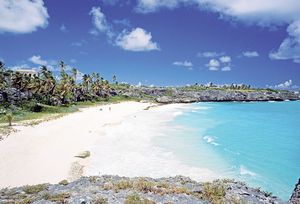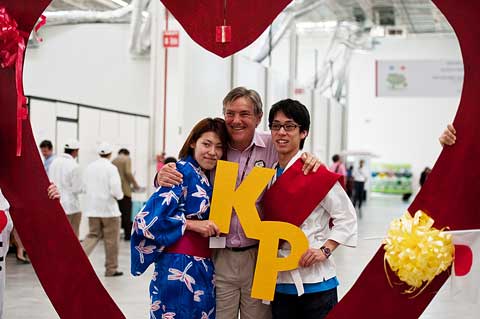This is a guest post from Cancun by Paul Young (bottom right in the pic – click to put names to faces) of the New Zealand Youth Delegation.
It tells you a lot about the nature of the COP16 climate conference in Cancun that I’m only writing this now. Gareth approached us – the New Zealand Youth Delegation – back near the beginning of the conference, offering a guest blog spot. “Fantastico!” we said. I set to work planning what I’d say, jotting down a few notes to finish over the next day or so.
That didn’t quite end up happening… I was unprepared for the full on assault on the brain, senses, heart, and email inbox that this has been. I wasn’t even an “insider” during the first week (to limit numbers, the UNFCCC Secretariat only gave us eight spots per week to share amongst twelve people), but that didn’t make much difference. For a start, there’s a fair bit going on outside with alternative events such as Klimaforum, and demonstrations like the La Via Campesina one on Tuesday. There’s a huge constituency of youth NGOs (under the banner YOUNGO) we’ve been (net)working with on policy, media campaigns, and actions. There’s plenty of work to be done trying to figure out what the hell is actually happening in the negotiations, and really getting to grips with the policy issues. Then there’s the battle of trying to garner any mainstream media interest in what’s going on over here.
You end up being in “go” mode around the clock, with little time to stop and think. You end up having to squeeze intense group meetings in late at night or in the early hours of the morning. You end up spending hours sitting on busses between the two main conference venues. You end up wasting hours in a bureaucratic ordeal trying to get approval for a very tame action inside the conference centre, only to have it shot down at the final hurdle. You end up losing your laptop power cable because you were in such a hurry packing up to get to the next event, and having to start your half-written blog all over again…
And then when you finally do get a chance to sit down and do some writing, your brain is often too tired and overloaded with information you are struggling to make sense of that the words just won’t come.
Anyway, I don’t mean for this whole blog to be a “dog ate my homework” exercise. I’m trying to express how the twelve of us in NZYD are feeling as these talks reach the hectic final stages before coming to a close, with it looking like the outcomes may not even succeed in meeting the depressingly low expectations.
For me personally, the last fortnight is a blur. It’s going to take a heck of a lot of reflection to process all that has happened and all that I’ve learned. I came here with one question in the forefront of my mind: does this UNFCCC process have a chance of delivering us the deal that we so desperately need? Right now, I’m not sure if I’ve come any closer to an answer. Will a consensus be reached on all the fine details, such as forestry rules, before it really is too late? Are the insufficient pledges on the table worth the effort in the first place? How much should we hold out for something stronger? Is it more important to get something in place, no matter how weak? If the talks were to collapse, would an alternative path emerge?
Hope remains, though. I have recognised the genuine desire in the politicians and negotiators to deliver a deal. The wise words of Bill McKibben, in his speech at the three-day Conference of the Youth that preceded the COP, have stuck with me. Paraphrasing from my sporadic notes, it went something like this:
In some sense, what goes on here inside the COP16 is the side-show. We are the centre. What happens inside is only a reflection of the work we are all doing back home in building the movement for action.
The battle against climate change is different from most other problems the world has faced; there is no guarantee we’re ultimately going to win. But there’s one thing you can guarantee: there are people like you all around the world who will keep fighting until the very end.
We’ve met many amazing people over the last fortnight, and what Bill says is true.


 T
T
